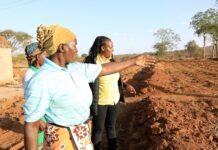A new study released by IFC, a member of the World Bank Group, shows strong demand for agricultural and catastrophic risk insurance by smallholder farmers in Madagascar to protect their livelihoods and build resilience to climate shocks.
The study estimates that up to 80 percent of Malagasy farmers, including small scale farmers with less than one hectare, are interested in agricultural insurance products to help increase their financial resilience to climate risks. The study also finds that creating awareness among farmers about the availability of agricultural insurance solutions is important to scale uptake and ensure sustainability.
The findings of the study will inform the design of a climate insurance pilot for Madagascar. Through the pilot, IFC will convene key stakeholders to design and test new products that will improve the resilience of smallholder farmers and promote financial inclusion.
Almost 80 percent of Madagascar’s population is involved in agriculture. However, due to its geographical location, Madagascar is largely affected by natural disasters, including droughts, cyclones, and floods, which threaten agricultural productivity and farmers livelihoods.
“Increasing financial resilience can help support farmers livelihoods and improve their contribution to the economy. The private sector can play a key role in developing innovative agriculture insurance products and addressing barriers that hinder uptake to protect farmers and increase their resilience,” said Marcelle Ayo, IFC Country Manager for Madagascar.
The Malagasy government has embarked on several efforts to increase small scale farmers financial resilience in light of climate change. However, establishing a strong financial resilience strategy for Madagascar will require increased collaboration between the public and private sectors, and development partners and stakeholders, who also need to harmonize their different climate risk solutions.
Additionally, climate insurance needs to be combined with other efforts, such as crop rotation, use of drought tolerant seed varieties and more efficient irrigation practices, that promote climate change adaptation to increase farmers productivity and sustainability.
The results of the study were disseminated at the Madagascar Agriculture Insurance Diagnostic workshop, organized by IFC and the Ministry of Agriculture and Livestock (MINAE), on July 25, 2022, in Antananarivo. The workshop was attended by public and private sector leaders, local farmers, agribusinesses, and insurance sector companies, among others.
The study was funded by the Global Index Insurance Facility (GIIF), a multi-donor program managed by the World Bank Group and supported by the governments of Japan, Germany, the Netherlands, and the European Union (EU).









